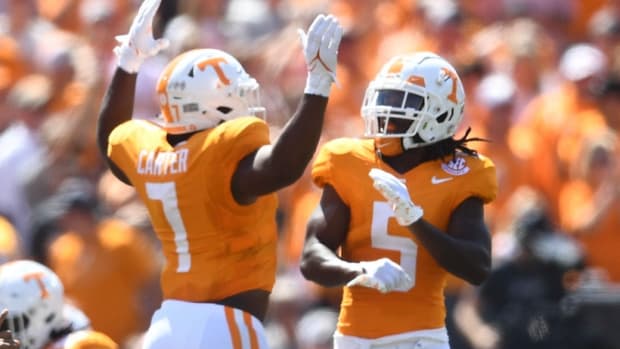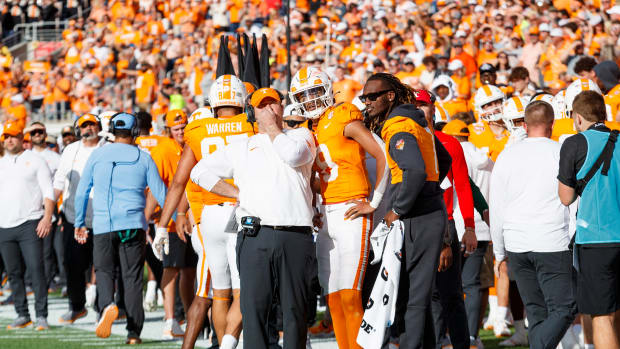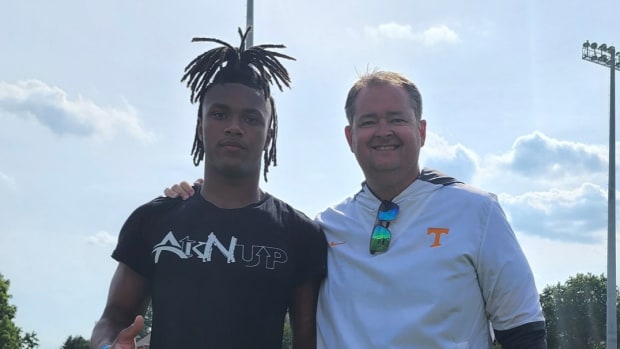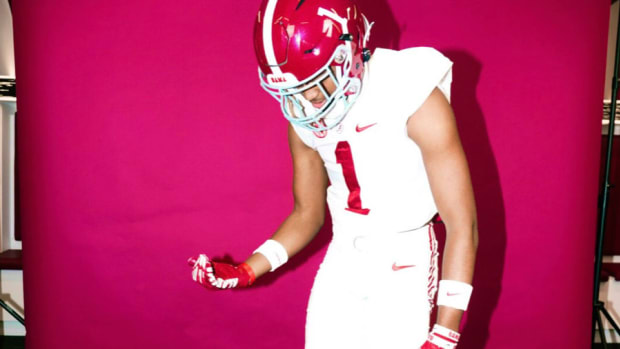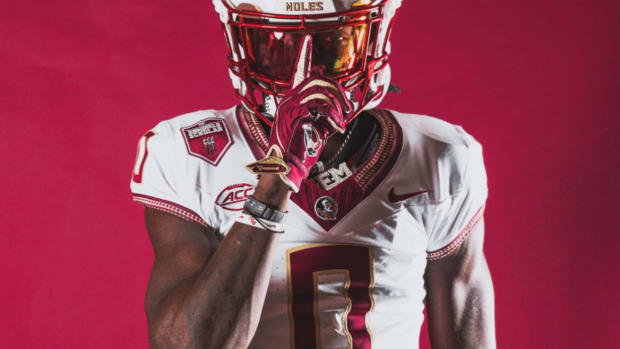Johnny Majors Leaves a Legacy as Perhaps Most Important Volunteer
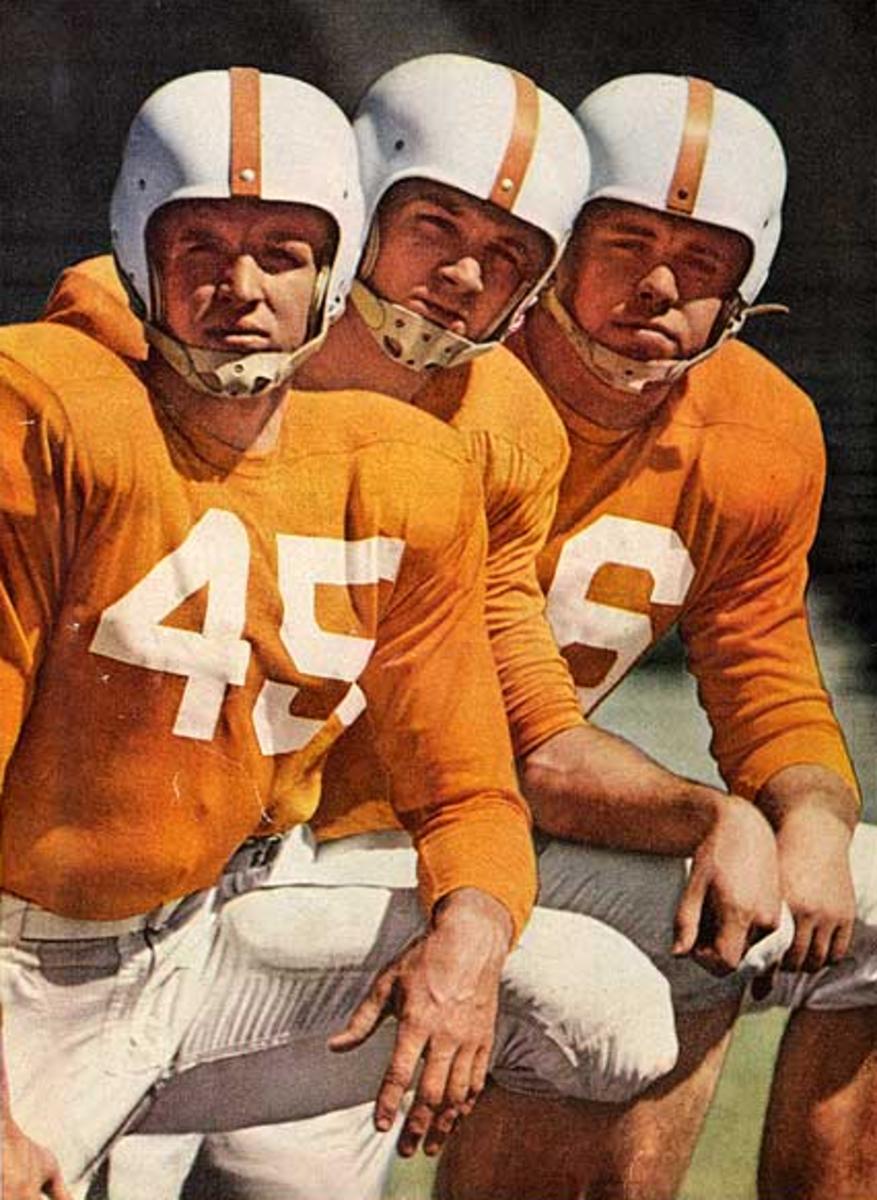
The University of Tennessee, in the midst of so much tragedy, mourns the loss of one of the most prominent men in the school’s history. Johnny Majors, one of the greatest players and coaches in the history of the University, has passed away at the age of 85. Majors was a native Tennessean that elected to play for the home-state Volunteers, and would ultimately go on to coach there as well. However there is more to the story of Johnny Majors than simply his time with the Vols. Majors can boast one of the most historic careers as both a player and coach, in the history of college football
In 1953, Knoxville was arguably one of the most intriguing cities on the college football landscape, though little of that attention had been garnered by the incoming freshman halfback from Huntland High School. The Vols were closely watched by the college football world in 1953 because at the conclusion of the 1952 season, legendary Tennessee head coach General Robert Neyland had decided to call it a career. After 21 seasons at the helm for the Vols, with several seasons away in active service to the United States Army, a new coach would replace Neyland on a permanent basis. Neyland's teams were four times crowned National Champions, and five times were champions of the SEC. The College Football Hall of Famer was the coach of the last team in NCAA history to go an entire regulars season without giving up a single point. Neyland had shaped the Tennessee program, and questions swirled about what the Vols would be with the coaching legend departing.
The answer to the image of a post-Neyland Tennessee would end up being remembered as Bowden Wyatt and the Majors Brothers, but Johnny was the one that first burst onto the scene. Tennessee, under Bowden Wyatt, was one of the last teams in the nation to go away from the single wing offense. The “T” formation offense saw the quarterback coming under center, and the evolution of what is thought of as the modern quarterback began there. In the single wing, the quarterback was essentially a blocking back, and the snap went directly to the halfback, and for the Vols, that was Majors. Majors was referred to as a, “Triple Threat,” halfback, a player that could run, throw, and kick. During his playing career, Majors did it all for Tennessee, and he did it all extremely well. Twice Majors was named the SEC MVP in 1955 and 1956. As good as Majors was in 1955, he was at his best in his senior campaign. In 1956, Majors was the driving force behind a Tennessee team that ended the season as the number two team in the Nation. Majors was the leading rusher and passer, but also played a significant part in helping the Vols field a defense that allowed only 88 points on the season. Serving as the punter for Tennessee, Majors often forced opponents into a long field against a stout Volunteer defense. Few players could ever boast the kind of impact Majors had on both sides of the ball in a single season. He was recognized as an All-American in 1956, and finished second in the voting for the Heisman Trophy. The award that season was given to Paul Hornung of 2-8 Notre Dame, instead. This is the only time in the history of the Heisman Trophy that the award was given to a player from a team with a losing record. To this day, many feel the award should have gone to Majors, sparking one of the oldest controversies in college football. Johnny Majors was elected to the College Football Hall of Fame for his career as a player in 1987. The number 45 is one of only eight numbers to ever be retired by the University of Tennessee, and it was done so in honor of Majors.
If the story stopped there, Majors would remain one of the most important and influential people to ever be associated with Tennessee, but the son of a football coach, Majors began his own coaching career as a Graduate Assistant at Tennessee in 1957. Majors was promoted to the backfield coach for the 1958 season, and his ascent through the coaching ranks began, until he was first named a head coach in 1968 at Iowa State. After showing success in Aimes, Majors was offered the head coaching position at the University of Pittsburgh. It was here that Majors would make one of his biggest marks on the history of college football. Majors took over a Panthers team that had gone 1-10 in 1972, and that hadn't had a winning record in nearly a decade. The Panthers went 6-5-1 under Majors in his first campaign at Pitt. It would be the beginning of a successful run for the program. The Panthers ended the season ranked number 20 in 1974, and in 1975 they finished the season 8-4, good for a final ranking of number 15. One of the great factors in the success of the Panthers was their All-American tailback, one Tony Dorsett. 1976 was Dorsett's senior year, and he put together one of the greatest seasons in college football history, on his way to winning the Heisman Trophy. The great tailback was coached by another great runner in college, who had, in his own senior campaign, finished second in the Heisman voting while his team finished second in the polls. Majors built his team around Dorsett, both relying on and complimenting his star runner. His strategy and understanding of the game, and how to use one of the greatest players in college football history, helped Pitt to a 12-0 record and the 1976 National Championship. Majors had been named the Walter Camp Coach of the Year in 1973, and he was named AFCA and Sporting News Coach of the Year in 1976. Majors had just won a National Title, he had shown he understood, perhaps from being one of the all-time great players in college football history, how to utilize other great players. His record had improved each season, he had coached a Heisman Trophy winner, and was the reigning National Champion at Pitt. Everything pointed to a long, historic tenure with the Panthers, until another one of the strangest moments in college football history occurred.
Johnny Majors was offered the position of Head Coach of the University of Tennessee in 1977. And he took it. The Vols were coming off a middle of the road season under Bill Battle, and Majors was on top of the College football world. It was clear that Majors would have an incredible amount of work to do in Knoxville, while his Pitt team, though without Dorsett, still returned a significant amount of talent. Yet, when offered the job, Majors chose to leave Pitt and come back to Tennessee. The Vols finished the 1977 season with a losing record, but Majors began his slow rebuild and overhaul of the program. In the 1985 season, the Vols won the SEC and the Sugar Bowl, ending the season with a 9-1-2 record by thrashing Heisman winner Vinny Testaverde and number 2 Miami 35-7. That upset by the Vols over the Hurricanes remains one of the biggest upsets in the history of Tennessee football, as the Vols stunned the Hurricanes. That game was the spring board into one of the greatest stretches in Tennessee history. The Vols would win the SEC in 1989 and 1990, capping the 1990 season with a Sugar Bowl victory over West Virginia, the last Sugar Bowl Tennessee has played in. Between 1985 and 1992, the Vols would finish inside the Top 5 of the AP poll three times, and inside the Top 25 all but twice. It was under Johnny Majors that the Vols again became major factor on the national stage of college football. Not only were the Vols consistently in the Top 15 in the nation, they fielded some of the best players in program history. Johnny Majors was the head coach for arguably the greatest defensive linemen to ever play the game in Reggie White. He also coached other Vol greats as Heath Shuler, James Stewart, Chuck Smith, Andy Kelly, Dale Carter, Carl Pickens, Charlie Garner, Aaron Hayden, Antone Davis, Alvin Harper, Charles McRae, Chuck Webb, Reggie Cobb, Keith DeLong, Terry McDaniel, Anthony Miller, Bruce Wilkerson, Tim McGee, Clyde Duncan, Willie Gault, Mike Cofer, Anthony Hancock, Roland James, Robert Shaw, and Craig Colquitt. It was during the 16 seasons under Johnny Majors that Tennessee earned their reputation as Wide Receiver U. The Vols would go on to one of the best decades in program history in the 90’s, but that run truly began in 1985, perhaps with the Sugar Bowl upset over Miami. Majors was carried off the field in victory again Bear Bryant and Alabama, he was the man on the sidelines for one of the most improbable comebacks in school history, a come from behind win at Notre Dame that became known as the Miracle at South Bend, and his team stifled Bo Jackson during his dominating Heisman Trophy run. Majors came to a middling Tennessee program from the reigning National Champions, and built the Vols into a premiere program and national contender again. He coached many of the greatest players in program history, and oversaw many if the highest moments for the team. Majors had truly given his all for Tennessee, which is why, his exit from the program after the 1992 season, as the Vols began an impressive decade, brought such contention.
Majors required emergency quintuple bypass surgery to save his life before the 1992 season. He was unable to coach the first four games, so his offensive coordinator, Phillip Fulmer, coached the team to a 4-0 start, including hammering number 4 Florida in, “The Downpour,” game. Majors came back an finished the season, but the University forced Majors out and promoted Fulmer. Majors returned to Pitt and coached his final four seasons there, which were by far the worst of his career. Meanwhile, Fulmer and the Vols reached enormous success in Knoxville. The way Majors was pushed out of Knoxville after his health scare resulted in bitterness toward Tennessee and Fulmer for many years. Many fans still hold with Majors, and that what had happened to him at the end of such a storied career in Knoxville was wrong. In recent years, however, Majors has returned to Neyland Stadium to be honored, to see his number retired, and to again walk into a stadium that would not exist as it does today had it not been for his influence.
Johnny Majors may not be the greatest coach in Tennessee history, that title almost undoubtedly belongs to Robert Neyland. He is certainly among the greatest players ever to don the Orange and White, though he has been overshadowed at times by names such as White, Adkins, and Manning. What Johnny Majors is, though, is perhaps the most important single man in Tennessee history. When the program was faced with the question of what it would become after the departure of General Neyland, it was Majors that became the face of the program. He left a reigning Nation Champion to return to his alma mater when they were struggling, then proceeded to build them into a national player again, directing the program to a prominent position in modern college football. He had success in Knoxville and elsewhere. Johnny Majors has achieved nearly every accolade that could be bestowed upon someone that spent a life around college football. He did so as a family man, respected by his players and his opponents. In his career as a player, assistant, and head coach, Johnny Majors associated 25 years directly with Tennessee, nearly all of them extremely successful in challenging times. Tennessee has lost quite possibly the most important figure in their football history, but the Majors family has lost a deeply loved man. Our condolences extend to the Majors family in this time, as we all mourn a man that touched so many, excelled so much, and etched his name in the college football history books over and over again.

